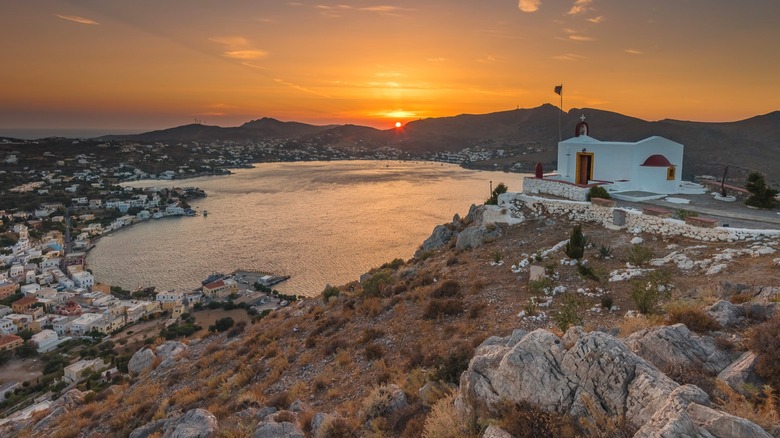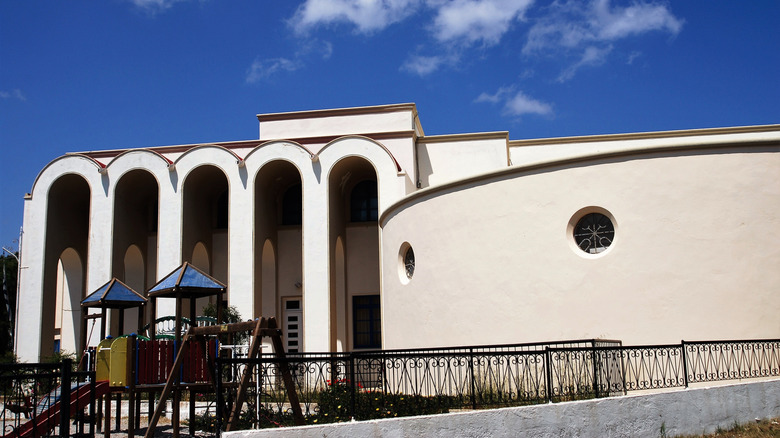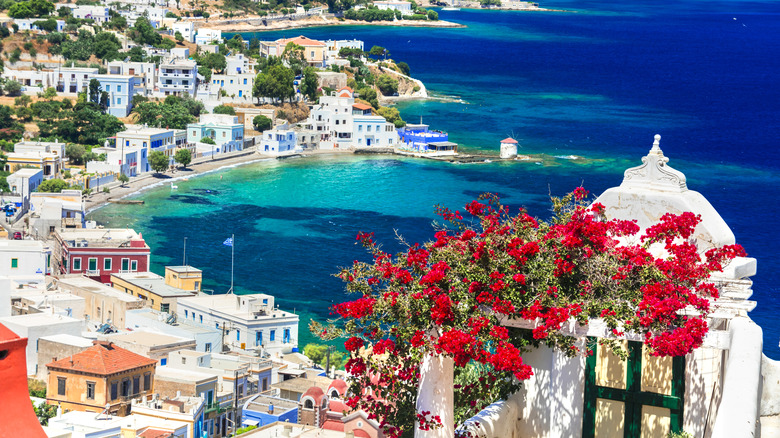This Underrated Greek Island Offers Italian Influences, Hidden Beaches, And Serene Aegean Sea Charm
Trying to choose just one Greek island to visit can be difficult. The Aegean archipelago is a treasure trove of jewel-like islands. The trendy beach bars of Mykonos and the white villages of Santorini are already swamped by visitors and cruise ship passengers. Fortunately, one of the best parts of discovering Greece is island-hopping.
The tiny island of Leros is often overlooked by visitors. For one thing, it's far from the Greek capital of Athens (more than 200 miles away) and closer to the "Turquoise Coast" of southwest Turkey. It has also been forgotten as a footnote in history. The Roman, Byzantine, and Persian empires all fought for control of Leros' enviably large deep-water port. The Ottoman Empire and Italian forces also occupied Leros in the preface to World War I. The World War II Battle of Leros even inspired the epic novel and film, "The Guns of Navarone."
Leros rewards visitors with much more than beautiful beach coves and traditional fishing villages. Its complex history has left a fascinating legacy visible in the island's art and architecture. To get there, you'll need to book a flight to Athens. From there, you can take a short 60-minute flight or a long ferry ride — more than 9 hours is the shortest route available — from Piraeus port in Athens. If you want to explore the island to its fullest, rent a car so you can travel wherever inspiration strikes.
Tranquil beaches and fascinating architectural history in Leros
In Greek myths, Leros was the private hunting ground of the Artemis, goddess of wild animals and the hunt. A Temple of Artemis existed on Leros Island, though the exact location remains buried under Roman ruins and early Christian churches. Still, the ruins are a reminder of Leros' significance even in ancient times.
Despite its small size, Leros has been coveted for its strategic location for centuries. At the outbreak of World War II, Italy's fascist leader, Benito Mussolini, decided that Leros' natural deep-water port of Lakki was crucial for his plan to dominate the Aegean and Mediterranean. He drafted architects to create an "Italian rationalist" utopia of minimalist architecture. Lakki was re-designed from the ground up but was quickly forgotten after the war. Greece's military junta used the island as an exile for political prisoners in the 1960s and '70s.
Today, the main port of Lakki is framed by unique, sometimes eerie, architecture that has attracted the attention of artists drawn to the peculiar mix of history, art, and design. There is also a movement to make the town a UNESCO World Heritage Site. "The town is now increasingly seen by Greeks for what it is: A completely unique city, not to be found anywhere else in Greece," writes British expatriate Susan Athanasakou in her blog, Greeker Than The Greeks, "and that's something worth preserving!"
Relaxed vibes and authentic beauty in Leros
Visitors today can explore this fascinating history while stopping to see the numerous coves and beaches around the island. The traditional fishing village of Pandeli, for example, is within easy reach of several tranquil beaches but also has an ancient castle, a picturesque column of traditional windmills, and a stunning sunset view from an old chapel. In addition to the Italian minimalist architecture, Lakki has an intact World War II tunnel that houses a museum for those interested in the Battle of Leros and the inspiration for "The Guns of Navarone." Pandeli and nearby Agia Marina are both popular areas with visitors because of the many tavernas and facilities within easy reach.
The island is quiet with tranquil beaches. Don't expect many trendy beach bars but it is a good place to explore a little-known corner of history and unwind with some gorgeous sea views. As Greek travel blogger, Angeliki, wrote on her blog Explore with Angel: "Surprisingly, this island isn't as famous as other Greek destinations, and you don't often hear about it, but that adds to its charm. The relaxed vibes and authentic beauty of Leros made me fall in love with it instantly." If you're looking for more Greek islands to explore, consider a trip to the favorite island of travel pro Rick Steves, the car-free beach idyll of Hydra.


